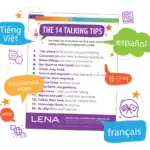
How to help infants and toddlers cope with a disaster
While young children are often not aware of large-scale threats, such as natural disasters or pandemics, they do notice changes to their immediate environment caused by these events. For example, a baby may sense a disruption to her usual routine or notice increased stress in her caregivers.
Infants and toddlers tend to communicate distress through their behavior, exhibiting changes in eating, sleeping, or snuggling habits, or regressing in behaviors like walking and crawling.
If you notice signs of distress in your child, you can help them cope by providing responsive caregiving. Tune in to what they’re doing and saying, and respond in a nurturing way. Keeping infants and toddlers physically close by will make it easier to notice and respond to their cues.
“If you feel you’re struggling to provide responsive care to your baby or toddler, ask your family or friends for extra help or contact your child health nurse or doctor,” the article’s authors encouraged. “The impact of an emergency can persist for some time. If you feel you’re still affected by the disaster, your baby or toddler might feel that, too. Give them and yourself time. Babies and toddlers usually recover well after emergencies. Your love and responsive care is the key.”
Download LENA’s 14 Talking Tips to get practical strategies for engaging with young children.
Mother/infant skin-to-skin touch boosts baby’s brain development and function
As the world prioritizes social distancing to stop or slow down the spread of coronavirus (COVID-19), a new study by researchers at Florida Atlantic University demonstrates that mother-infant touch and contact are essential for optimal neurodevelopmental regulation in early infancy.
Kangaroo Care, a skin-to-skin, chest-to-chest method of caring for a baby, especially one who is premature, has been associated with promoting neurophysiological development. This method of caring emphasizes the importance of holding the naked or partially dressed baby against the bare skin of a parent, typically the mother. New research shows that extended use of Kangaroo Care can positively benefit full-term infants and their mothers during the postpartum period.
The researchers measured levels of hormones associated with stress (cortisol) and love (oxytocin) in both mother and baby. The pairs who used Kangaroo Care showed increases in oxytocin and decreases in stress reactivity.
“Our findings across several studies demonstrate a link between the supportive dimensions of maternal caregiving behavior and left hemisphere neurodevelopment, with maternal warmth and sensitivity predicting greater regulatory abilities and secure attachment,” senior author Nancy Aaron Jones said. “Full-term infants and their mothers likely benefit from the positive interactive experiences inherent in extended Kangaroo Care use.”
Coronavirus brings to light invisible caregiving work
Invisible caregiving work has been made visible by the COVID-19 outbreak, according to Australian researchers, illuminating a “care crisis” within family systems.
The team analyzed data from Google searches, which showed that searches for terms related to the economy spiked first, followed a few days later by searches related to child care. In four states — Nebraska, Kansas, Iowa, and Minnesota — people searched more often for terms related to child care and coronavirus than the economy and coronavirus, suggesting a lack of child care resources as the users’ primary concern.
“COVID-19 will be devastating in its effect on our health, families, and economy. But, as we face this new, brave world together, it is important to understand the role of caregiving and the importance of carers in this crisis,” the team explained. “To date, women have done this work freely for families. But now the burden is too big and we need to see this work for what it is – important, essential, and of great economic value. Individuals can use this as an opportunity to try something new, but also take stock of what we value as a society.”



